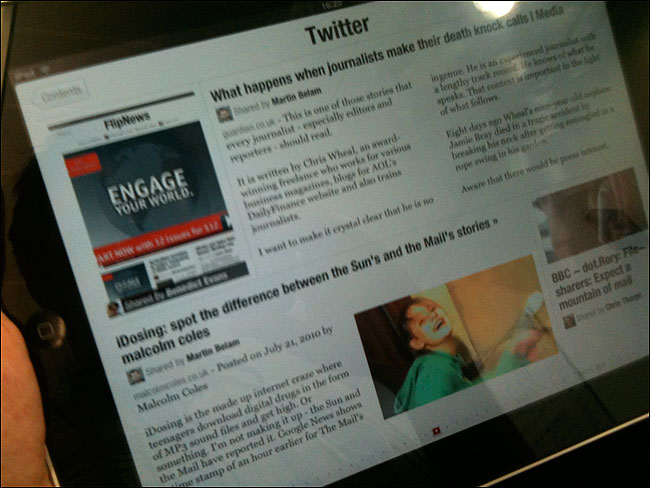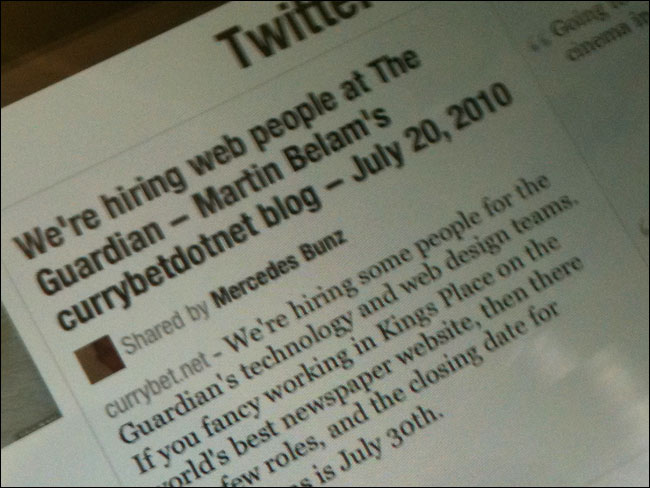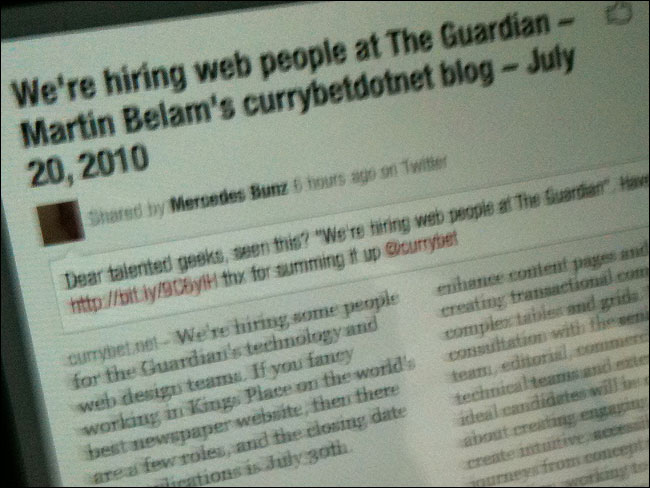Flipboard: Great app, but is it yet another way for publishers not to get paid?
We were playing around with Flipboard - the personalised social magazine app - in the office today. Even though the aggregation I was seeing was of the links passing through a colleague's Twitter stream on their iPad, it was obvious that it is a compelling proposition.That is no surprise if you consider the implications of the recent BBC College of Journalism study into how people use news on social networks.
And, being the iPad, it was pleasingly tactile, and the crisp screen made things looks really sharp. Not that you'll be able to tell that from the blurry photos that I took!

But I had mixed feelings
Two things troubled me - one as an information architect, and one as someone who occasionally likes to get paid for writing.
Just from flicking around the app it wasn't entirely clear what algorithm was shaping the display.
I came away with the impression that the presentation of content was being driven in part by the image sizes contained in an article, in part by the ease of extracting a meaningful length snippet from a page, and in part by the timeline with which links had been shared on Twitter.
Those are all well and good, but this was maybe an overdose of social serendipity, and not enough classic editorial information hierarchy. It doesn't matter how may times it has been shared, by whom, or when, a parasailing donkey is always an 'And finally...' curiosity, not the most important story in the world.
It also seemed to me, as a small publisher here on currybetdotnet, that it was yet another layer of disintermediation that took away some of my abilities to understand how and when my content was being used, or to monetise my work.

There is no doubt that the stripped down magazine style made my content look very readable. But as I looked at one of my own articles reformatted on the iPad, I couldn't help thinking that I was never going to see any metrics for that page view.

Nor did I have the opportunity to serve any adverts alongside it.
OK, that is a slightly moot point for this blog, as I've recently stopped displaying AdSense on the pages - but with Flipboard I just don't even get the option.
It really is a lovely app though, and I could easily envisage myself flicking through that content towards the end of the day, whereas I never quite seem to get round to reading the links embedded in the tweets I've marked as 'favourites'. But, as we seem to be moving away from a web of HTML & browsers into a web of mobile appland, it looks like services like Flipboard might be making it harder for publishers to get an overview of their content use.
And harder for them to get paid.
I agree, as a small publisher myself, I've given up on getting a true view of who is using my content but it's always good to at least get some attribution. I noticed that on your example of your own content, the sharer seems to get the byline!
As for running ads, I have proposed an "adtribution" model that would automatically give permission for others to use one of my stories if they also would run one or two text-ad links that come with the story. That way my advertisers would get to benefit from the distribution my content receives. It would seem to be a reasonable request and could be made easy to do -- as people select, copy then paste a story, the ad links could be copied and pasted automatically. We have the technology to that easily.
It's all about getting paid my friend!
It's only a matter of time before this and other apps become monetized. Though just how the authors and rightful owners of the content will get paid may remain a mystery.
Still, nothing "free" and popular lasts for long. Adverts will begin to appear, then there will be a paid version that allows you access without ads. Either way, there will be money.
As for metrics on things like this, those will have to be added somewhere in the background in order to make the adverts work - impressions, demographics, etc. that are important to the advertisers with the big bucks.
So, never fear! This will become monetized and tracked to some degree.
Though how you'll get your data and your cash, now that's the mystery.